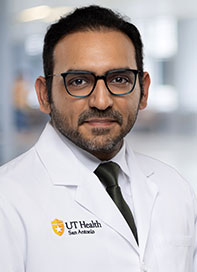Get the highest level of care and treatment from exceptionally skilled liver transplant doctors and surgeons at University Health Transplant Institute.
Do You Need a Liver Transplant?
A working liver is essential. You cannot live without it. You may need a transplant because your liver doesn’t work well because of liver damage from cirrhosis, hepatitis B or C, liver cancer or another disease. Ease your fears if you have liver disease because liver transplant can treat end-stage liver disease (chronic liver failure).
We also perform liver transplants for children.
Liver Health
Visit the liver health section of our website to learn more about your liver and the conditions that affect it. Depend on us for complete liver care for liver diseases, cancerous tumors and noncancerous tumors at the Texas Liver Tumor Center at University Health.
Why Choose University Health?


We are the No. 1 liver transplant program in the nation, according to INTERLINK (2023-2025). We are also a designated Center of Excellence by the following health plans and organizations:
- Aetna
- Blue Cross Blue Shield Association
- Blue Cross Blue Shield of Texas (cadaveric liver donation)
- LifeTrac
- Optum Health
Benefit from distinctive care, efficient processes and compassionate support and services. You’ll appreciate:
- Bilingual staff and translators to make sure you are informed and understood throughout the transplant process
- Centrally located Transplant Institute services in San Antonio’s medical center area
- Dedicated, vital transplant research and innovation programs allowing you access to the most advanced, up-to-date treatment options, techniques and medications
- Easy-access transplant outreach clinics in South Texas cities, such as Austin, Corpus Christi, New Braunfels, Laredo and El Paso
- Excellence and quality designations and recognitions for transplant services
- Financial counselors to help you understand your costs for a transplant and interpret your insurance benefits
- High success and survival rates for liver transplant―Our outcomes are the best in Texas and exceed national expectations, according to the Scientific Registry of Transplant Recipients
- Knowledgeable, experienced transplant doctors with medical expertise in their field and surgeons who have performed more than 1,885 liver transplants
- Pre- and post-transplant patient education, resources and support services
- Second-highest number of living-donor liver transplants in the U.S. in 2019
- The only program in South and Central Texas to offer living-donor liver transplants. It is a streamlined approach to living liver donation that helps you get a transplant quicker
UT Health San Antonio Partnership
In partnership with UT Health San Antonio, our deep expertise, years of experience, devotion to patient-centered care and dedication to research makes us a leader in liver transplants. We perform transplants for children and adults.
How to Get Transplant Care
When your liver specialist (gastroenterologist or hepatologist) recommends transplantation as a treatment option, look to University Health for the care you need. If you match the patient criteria for a transplant, your doctor can start the referral process. You also can make an appointment without a doctor’s referral.
Evaluation Process
Learn if you are eligible for liver transplantation at University Health through an evaluation. Plan for:
- Your first visit to University Health Transplant Institute
- Evaluation and testing to find out if you are a candidate for transplantation based on your health and medical conditions
- Finding out if you are an approved candidate for a liver transplant
Transplant Process
If you are a candidate and transplantation is your best treatment option, you’ll:
- Consider living liver donation
- Maintain your health and while you’re on the liver transplant waiting list
- Have liver transplant surgery
- Recover after transplant surgery and follow-up care

Types of Liver Donors
Your liver is the only organ in the body that can regenerate (grow back). That means you may opt to receive a liver from a living person who wants to donate a small part of their liver. Rely on us to perform the following types of liver transplants:
- Deceased donor – Your new liver comes from a deceased donor as it becomes available through the national computerized waiting list known as United Network for Organ Sharing (UNOS).
- Living donor – Your new liver comes from a living donor, such as a family member, close friend or someone you do not know.
Why University Health for Liver Transplant
University Health Transplant Institute is the No. 1 liver transplant program in the nation. It is recognized as a Center of Excellence by the following health plans and organizations:
- Aetna
- Blue Cross Blue Shield Association
- Blue Cross Blue Shield of Texas (cadaveric liver donation)
- LifeTrac
- Optum Health
Top Patient Survival Rate in South Texas
Our patient outcomes routinely exceed national averages, meaning our patients stay healthier longer.
Our liver transplant program consistently achieves outstanding patient survival rates according to the Scientific Registry of Transplant Recipients (SRTR). Our outcomes are regularly reported by the SRTR and you can view our data on the organization's website.






